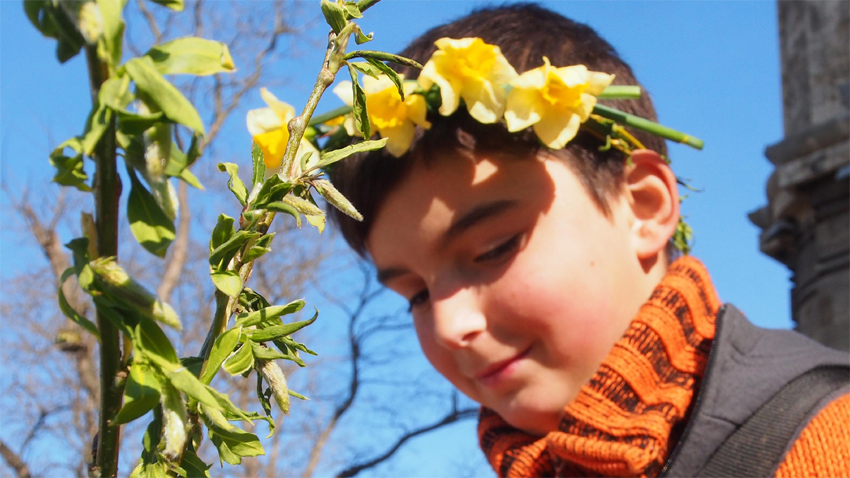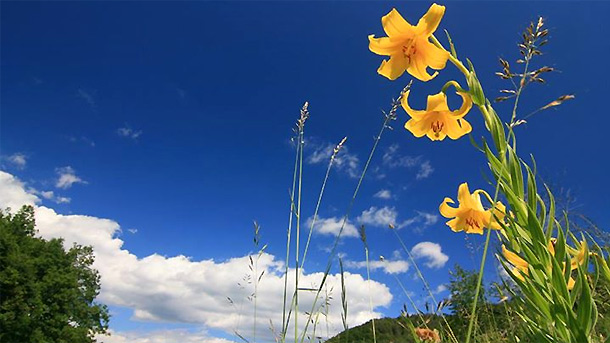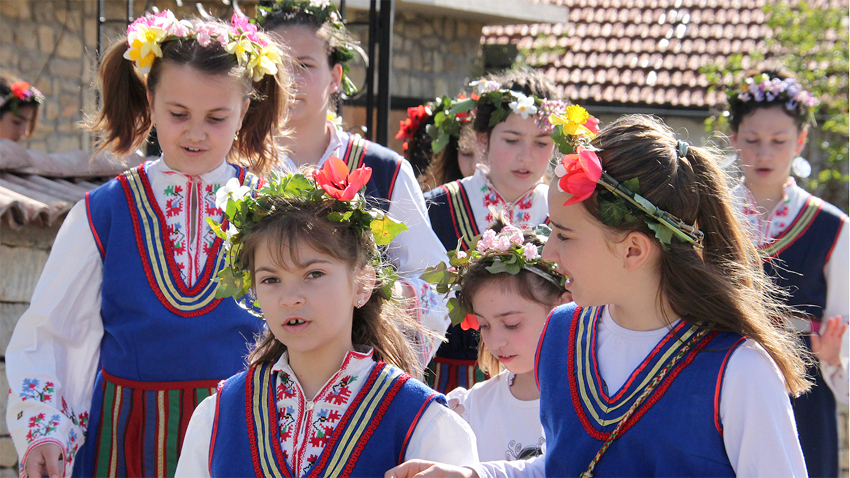 What does it feel like to be named after a flower? There are many Bulgarians who know the answer to this question and they all celebrate their name day on Tsvetnitsa, Palm Sunday, or literally – Flower Day. Even though many foreign names have been making their way in the country, there are ancient names that have remained as popular as ever, like Tsvetan, Tsvetanka, Nevena, Iglika, Ralitsa, Kalina, Zdravko etc. This day, Tsvetnitsa, is the day on which all people bearing the names of flowers, shrubs or trees celebrate. And that would include names like Daisy, Veronica, Dahlia, as well as names that have entered our lives earlier – Violeta, Kamelia, Zhasmina… Though these are names we are certainly not going to find in the folk songs we have selected for you in this edition of Folk Studio.
What does it feel like to be named after a flower? There are many Bulgarians who know the answer to this question and they all celebrate their name day on Tsvetnitsa, Palm Sunday, or literally – Flower Day. Even though many foreign names have been making their way in the country, there are ancient names that have remained as popular as ever, like Tsvetan, Tsvetanka, Nevena, Iglika, Ralitsa, Kalina, Zdravko etc. This day, Tsvetnitsa, is the day on which all people bearing the names of flowers, shrubs or trees celebrate. And that would include names like Daisy, Veronica, Dahlia, as well as names that have entered our lives earlier – Violeta, Kamelia, Zhasmina… Though these are names we are certainly not going to find in the folk songs we have selected for you in this edition of Folk Studio.
 A symbol of the rebirth of nature, flowers are a delight to the eyes in all seasons, but in springtime their beauty is unparalleled. Flowers are a permanent feature of all Bulgarian rituals and traditions. One of the patterns woven onto ritual loaves of bread is called “flower”, usually a rose, but in some parts of the country – tree blossoms. The “flower” symbolizes youth, fertility, a new beginning and it is fashioned onto the bread with just such well-wishes. “Garden” is another form of decoration, but it is made out of a bigger lump of dough with wishes for happiness, health and a long life. According to our ancestors, to name children after a flower, a shrub or a tree means to wish them to be attractive, healthy, happy, to be surrounded by love and attention.
A symbol of the rebirth of nature, flowers are a delight to the eyes in all seasons, but in springtime their beauty is unparalleled. Flowers are a permanent feature of all Bulgarian rituals and traditions. One of the patterns woven onto ritual loaves of bread is called “flower”, usually a rose, but in some parts of the country – tree blossoms. The “flower” symbolizes youth, fertility, a new beginning and it is fashioned onto the bread with just such well-wishes. “Garden” is another form of decoration, but it is made out of a bigger lump of dough with wishes for happiness, health and a long life. According to our ancestors, to name children after a flower, a shrub or a tree means to wish them to be attractive, healthy, happy, to be surrounded by love and attention.
Once upon a time there lived a man and a woman, they had a little girl, a daughter, as pretty as a flower – there are many folk tales that begin with these words. In Bulgarian tradition, flowers are the symbol of beauty, but also of gentleness, freshness and fertility. On Tsvetnitsa women – young brides as well as unmarried lasses – would collect willow twigs and pick flowers, make wreathes and posies and use them to decorate icons and the utensils they used to fetch water with.

In Bulgarian tradition, it is mostly women who are named after flowers. But there are quite a few men names as well – the highly popular Yavor (sycamore) and Yassen (ash tree) which, in folklore, are said to have the capacity to protect. There are other names that were popular once, but which, though rarely, still exist in some parts of the country to this day - like Bosilko, Sedefcho (from the plant rue, which is thought to have magical properties), Trendafil, Rosen, Vurban etc.
But as flowers are said to do good, they can also do evil. That is why people must know their properties well. Red multiflora rose, avens, fraxinella ward off mischief by wood-nymphs, marigold protects against dragons… Grown in the girl’s garden or picked in the fields, they find a place in legends, songs and herbal use practice, lend colour to life, bring to mind serene thoughts. On Tsvetnitsa flowers must be plentiful, because this is the day that marks the end of the entire cycle of spring maiden games.
English version: Milena Daynova
The Philip Koutev National School of Folk Arts is not just any school - it is a talent laboratory. It is the first school not only in Bulgaria but in the Balkans for professional study of folklore. It is located in the heart of the beautiful town of..
Scientists from the Sorbonne will study the cultural heritage preserved in the Regional Ethnographic Open-Air Museum "Etar" , informs public broadcaster BNT. In March this year the French scientists together with experts of REOM "Etar" will study elements..
The day of St. Tryphon (1 February old style, 14 February new style) is celebrated by vine growers, falconers and gardeners in Bulgaria. Trifon Zarezan comes around with vine pruning and wine drinking St. Tryphon is believed to help..

+359 2 9336 661
